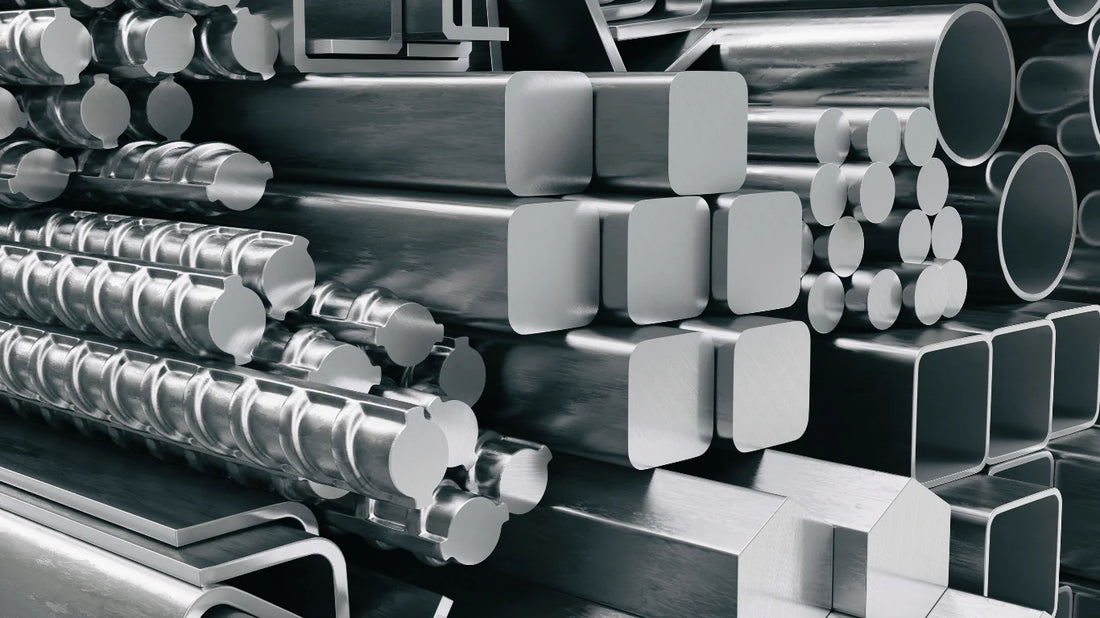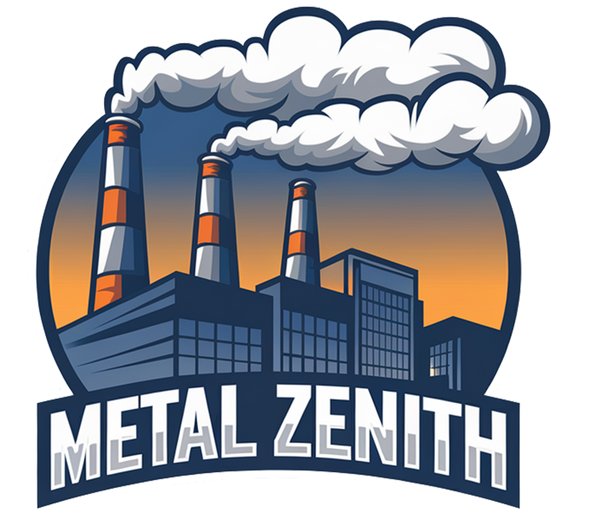
What Is SUS Material? Demystifying SUS304 Stainless Steel
Share
Table Of Content
Table Of Content
SUS 304 stainless steel is a top material known for its resistance to corrosion, moldability, and strength. This type of steel is used in many industries from food processing to building design and everyday products. The term "SUS" comes from Japanese standards and means "Steel Use Stainless." The number 304 shows its specific mix of metals.
SUS material is everywhere in our daily lives. It offers great protection against rust while being easy to work with for many different shapes and uses.
This guide will explain what SUS304 is all about. We'll look at what makes up this steel, its special qualities, and where people use it most often.
Whether you're buying materials for projects or just curious about what makes your kitchen appliances so durable, this overview will help you understand why SUS304 is such a popular choice.
Introduction to SUS Material
Stainless steel contains at least 10.5% chromium, which helps it resist rust. The "SUS" label comes before many Japanese steel types and stands for "Steel Use Stainless." This shows it's made to prevent corrosion and last a long time.
SUS304 is the same as 304 stainless steel. People choose it when they need something that's both strong and won't rust easily.
Engineers use SUS304 in places where cleanliness and durability matter most. For example, food processing plants use it because it resists acidic foods and cleans easily. Modern buildings use it for outside walls because it can be shaped into curves while standing up to different weather.
The added chromium and nickel make SUS304 resist rust better while keeping it strong and reasonably priced. This is why medical device makers and kitchen equipment companies choose it so often.
What Does SUS304 Mean?
Understanding the name and makeup of SUS304 helps explain why it works so well.
Breaking Down the SUS Label
"SUS" in SUS304 stands for "Steel Use Stainless." This comes from Japanese Industrial Standards but matches well with other countries' systems. Americans call it AISI 304, but SUS304 is known worldwide. For more details, check the Stainless Steel Overview on Wikipedia.
The SUS label shows this steel can handle rust-causing conditions well. Engineers anywhere can use "304" grade steel knowing it will meet strict quality standards.
The Significance of the Number 304
The number "304" tells us about the steel's ingredients. It usually has about 18% chromium and 8% nickel. Chromium forms a thin layer on the surface that blocks oxygen and prevents rust. Nickel makes the steel more bendable and helps it resist acidic environments.
This mix of 18% chromium and 8% nickel creates the perfect balance of flexibility and rust resistance. Tests show this combination prevents rust even when conditions change often. This is why engineers pick SUS304 for projects that need to last long and work well in hot or cold temperatures.
Key Properties and Advantages of SUS304 Stainless Steel
SUS304 has a mix of physical, mechanical, and chemical features that make it stand out from other metals.
Physical and Mechanical Properties
SUS304 has several qualities that make it a top choice:
- Corrosion Resistance: The 18% chromium creates a self-healing layer that protects against rust and corrosive chemicals. This works well in places with moisture, acids, and other harmful substances.
- Strength and Durability: SUS304 has great tensile strength and can handle heavy stress and strain. This makes it good for tough applications.
- Non-Magnetic Properties: When properly treated, SUS304 doesn't attract magnets. This helps in sensitive equipment where magnetic fields could cause problems.
- Formability and Weldability: SUS304 can be bent, shaped, and welded without breaking. This makes it perfect for complex designs.
Here's how SUS304 compares to other stainless steels:
| Property | SUS304 | SUS316 | SUS201 |
|---|---|---|---|
| Chromium Content | ~18% | 16-18% | ~16-18% |
| Nickel Content | ~8% | 10-14% | 3-5% |
| Corrosion Resistance | High | Very High (with Mo) | Moderate |
| Magnetic Properties | Non-magnetic | Non-magnetic | Slightly Magnetic |
| Formability | Excellent | Good | Fair |
Source: Grade 304 Stainless Steel Properties
Benefits in Various Applications
SUS304 works well in many industries because of its balanced properties:
- Food Processing Equipment: It's clean and doesn't rust, making it perfect for kitchens and food plants.
- Architectural Applications: It's easy to work with and looks good, so it's used in building fronts, handrails, and decorative elements.
- Medical Devices: SUS304 doesn't react with body tissues, so it's safe for surgical tools and implants.
- Automotive and Aerospace Components: Its strength-to-weight ratio and ability to handle temperature changes make it good for these industries.
Real-world tests show that SUS304 works better than alternatives, especially in places with many chemicals or big temperature changes.
Common Applications and Industries Using SUS304
SUS304 is used in many different fields because it's so versatile.
Industrial and Manufacturing Applications
SUS304 is essential in many industrial settings:
- Construction and Architecture: Used in building coverings, roofs, and decorative elements where looks and durability matter.
- Automotive and Equipment Manufacturing: Used in exhaust systems, supports, and trim because of its strength and rust resistance.
- Food and Beverage Processing: Processing equipment, tanks, and pipes use SUS304 because it resists rust and is easy to clean.
- Chemical Processing Industries: Its chemical stability ensures safe operation around acids and solvents.
Companies report fewer breakdowns due to rust when they use SUS304, which saves money and time.
Consumer Products and Everyday Uses
SUS304 is also found in many everyday items:
- Kitchen Equipment: Common in sinks, countertops, knives, and cookware because it's clean and lasts long.
- Water Bottles and Utensils: Its durability and safety make it good for reusable items that need frequent washing.
- Household Appliances: Found in refrigerators, dishwashers, and other appliances for both performance and modern looks.
Product designers choose SUS304 to reduce maintenance costs and make products last longer.
In-Depth Analysis and Unique Perspectives
Beyond basic specifications, practical insights from industry experts highlight the special benefits of SUS304.
First-Hand Experiences and Practical Tips
Engineers working on big projects note that choosing SUS304 can prevent many maintenance problems. For a stainless steel sculpture project, engineers recommended specific welding techniques to maintain the protective chromium layer. Key tips include:
- Clean surfaces before welding to avoid contamination.
- Use proper treatments after welding to restore the protective layer.
- Consider the environment: while SUS304 works well in most conditions, places with lots of salt may need extra protection.
These real-world experiences show the importance of understanding both the strengths and limits of SUS304.
Critical Comparison: SUS304 vs. Other Stainless Steel Grades
When comparing SUS304 with grades like SUS316 and SUS201, several differences emerge:
| Feature | SUS304 | SUS316 | SUS201 |
|---|---|---|---|
| Corrosion Resistance | High -- ideal for most environments | Very High -- excellent in chloride-rich areas | Moderate -- less resistant to acid attack |
| Strength & Durability | Excellent tensile strength and impact resistance | Comparable strength with added corrosion resistance due to molybdenum | Adequate strength for general applications |
| Cost | Moderate -- cost-effective for many industries | Slightly higher due to alloying elements | Lower -- economical choice for low-stress applications |
| Formability | Excellent -- easier to fabricate and weld | Good -- slightly more challenging to form | Fair -- may require additional processing |
Source: Grade 304 Stainless Steel Properties
From a technical view, SUS316 offers better performance in very corrosive environments but costs more. SUS201 may work for less critical uses but doesn't resist rust as well as SUS304. Choosing the right grade depends on the specific environment and requirements of your project.
Many experts recommend SUS304 for its versatility and good balance of performance and cost. Data shows that equipment made with SUS304 often costs less over its lifetime when you consider maintenance and replacement.
Conclusion and Final Thoughts
SUS304 stainless steel combines the perfect mix of metals with modern manufacturing needs. Understanding that "SUS" means "Steel Use Stainless" and that "304" indicates a mix of about 18% chromium and 8% nickel helps explain why this material works so well in so many applications.
The advantages of SUS304--its rust resistance, strength, flexibility, and non-magnetic properties--make it reliable for engineers and material experts. For projects that need to last long and look good, SUS304 is a proven option with lots of real-world success.
When choosing materials for your next project, think about both the immediate benefits of SUS304 and its long-term cost savings and easy maintenance. With extensive testing and comparative data supporting its benefits, SUS304 remains the industry standard that combines innovation with practicality.

2 comments
Launch into the stunning galaxy of EVE Online. Become a legend today. Conquer alongside hundreds of thousands of explorers worldwide. [url=https://www.eveonline.com/signup?invc=46758c20-63e3-4816-aa0e-f91cff26ade4]Start playing for free[/url]
https://www.hqsteelgroup.com/products/Stainless-Steel/Stainless-Steel-Coil/304L-Stainless-Steel-Coil.html